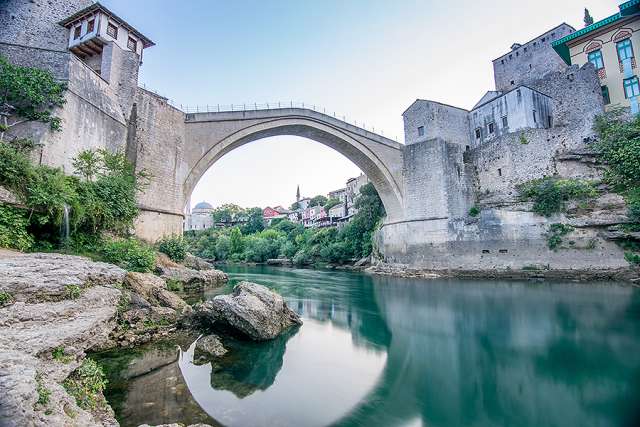When Pope Francis visited Bosnia and Herzegovina two years ago, he found a country still healing from a devastating conflict two decades earlier.
The three-year Bosnian War killed around 100,000 people and displaced a million more. Although ethnic and religious violence tapered off after the peace treaty of 1995-96, deep cultural and religious divides are enduring.
Now, a historic master’s program has been created in Sarajevo that primarily focuses on Interreligious Studies and Peacebuilding, taught by the three major theological seminaries of Catholic, Islamic and Orthodox thought.
“This program represents efforts of the three faculties to work, on a scientific basis, on peace-building and reconciliation in this country,” said Darko Tomasevic, the dean of the Catholic Theological Faculty at the University in Sarajevo.
“Above all, we want to ensure as good a foundation as possible for a better future for Bosnia and Herzegovina, in the capacity that we, as institutions within religious communities and churches, can provide,” Tomasevic said.
The first of its kind in the region, the master’s program was coordinated by Catholic Relief Services, in conjunction with the Faculty of Islamic Sciences, the Catholic Theological Faculty and Orthodox Theological Faculty of St. Basil of Ostrog.
According to Zuhdija Hasanovic, the dean of the Faculty of Islamic Sciences at the University in Sarajevo, the program is an effort to be more intentional about healing the country’s divisions with an attitude of respect.
“Each of the faculties works on developing a sense of respect for ‘others,’ or different ones, but this study program is something special and it will, hopefully, yield results,” he said.
The first class began on Oct. 26, and the program will run over the course of the next year. Professors and teachers from all three seminaries will lead the program, which now includes 23 students. The course is aimed at students who have backgrounds in theology, social sciences and humanities, and are interested in interreligious studies and peacebuilding.
“Joint-study programs like this one offer a unique opportunity to use religions as a catalyst for peace,” stated Marc D’Silva, the CRS country representative in Bosnia and Herzegovina.
“This program will show how religious institutions can train a new generation of religious and civil society leaders to be advocates for a more just and better society,” D’Silva continued.
The master’s program is currently only being offered to local students, but there are hopes of expanding the course to international students. CRS is also promoting scholarships, internships and job opportunities with local government officials and civil society organizations in the country.
The official international humanitarian agency of the Catholic community in the U.S., Catholic Relief Services has had a presence in Bosnia and Herzegovina since 1993, when it began offering emergency relief services to victims of the war in Sarajevo. Post-war, CRS continued to offer aid by helping displaced families return to their homes. The organization has a continued presence in the country today through education, psychological support, rebuilding homes and promoting livelihoods.
Pope Francis’s pastoral visit to Bosnia and Herzegovina in 2015 was seen as an important step in unity, in a nation where religion is closely tied to ethnicity. Forty percent of the country’s 3.8 million people are Muslim/Bosniak and another 40 percent are Orthodox/Serbian. Fifteen percent are Catholic/Croats.
“There is no other foundation on which the culture of peace can be based, but on interreligious dialogue,” stressed Vladislav Topalovic, dean of the Orthodox Theological Faculty “St. Basil of Ostrog” of the University in East Sarajevo.
“It is our only exit, our only path on which we can base that culture of peace, and trust among all of us in Bosnia and Herzegovina.”
















